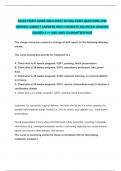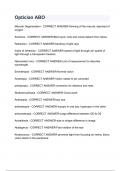-
1. Exam (elaborations) - Mark klimek nclex review
-
2. Exam (elaborations) - Nclex-rn notes
-
3. Exam (elaborations) - Nclex prep archer latest questions with complete solutions.
-
4. Exam (elaborations) - Archer nclex day 1 (cardiovascular) questions with 100% correct answers.
-
5. Exam (elaborations) - Archer nclex pharm questions & answers solved 100% correct!!
-
6. Exam (elaborations) - Archer review fundamentals nclex quizzes & ans rated a+
-
7. Exam (elaborations) - Antepartum nclex study questions with 100% complete solutions.
-
8. Exam (elaborations) - Antepartum nclex questions and answers correctly answered!!
-
9. Exam (elaborations) - Ob antepartum care nclex questions and answers already graded a+
-
10. Exam (elaborations) - Postpartum nclex style questions correctly answered to score a+
-
11. Exam (elaborations) - New generation nclex questions for 2023/2024 exam all answers are correct. all the be...
-
12. Exam (elaborations) - Nclex exam nclex-pn questions with answers and explanations
-
13. Exam (elaborations) - Patient safety and quality (nclex questions) answered correctly_ summer 2023/2024.
-
14. Exam (elaborations) - nclex prep archer latest questions with complete solutions.
-
15. Exam (elaborations) - archer nclex day 1 (cardiovascular) questions with 100% correct answers.
-
16. Exam (elaborations) - archer nclex pharm questions & answers solved 100% correct!!
-
17. Exam (elaborations) - archer review fundamentals nclex quizzes & ans rated a+
-
18. Exam (elaborations) - Antepartum nclex study questions with 100% complete solutions.
-
19. Exam (elaborations) - Antepartum nclex questions and answers correctly answered!!
-
20. Exam (elaborations) - Ob antepartum care nclex questions and answers already graded a+
-
21. Exam (elaborations) - Postpartum nclex style questions correctly answered to score a+
-
22. Exam (elaborations) - Ati nclex challenge 2 questions and complete solutions
-
23. Exam (elaborations) - Complex blood count (cbc) nclex 2024 latest exam update questions(with 100% correct a...
-
24. Exam (elaborations) - Nclex-rn ngn review latest 2024 actual exam questions with verified answers 100% comp...
-
25. Exam (elaborations) - remar qf 2024 nclex ngn exam 2024 latest actual questions with complete answers ver...
-
26. Exam (elaborations) - Nclex ngn review actual exam questions latest update with complete verified answers b...
-
27. Exam (elaborations) - Nclex ngn pre-test questions latest version with complete correct verified answers 10...
-
28. Exam (elaborations) - Remar ngn nclex actual exam questions and verified correct answers with complete solu...
-
29. Exam (elaborations) - Ngn pn nclex exam 2024 latest updates actual questions with complete verifeid correct...
-
30. Exam (elaborations) - Nclex-rn test 1 ngn exam 2024 questions and verified correct answers with complete so...
-
31. Exam (elaborations) - 2024 (january) nclex practice questions with correct answers 100% verified by expert...
-
32. Exam (elaborations) - nclex study guide 2024 latest actual exam questions and verified correct answers wit...
-
33. Exam (elaborations) - Nclex medications 2024 latest actual exam questions and verified correct answers by e...
-
34. Exam (elaborations) - Nclex-need to know 2024 exam questions with complete solutions
-
35. Exam (elaborations) - Nclex meds 2024 actual exam questions and verified complete correct answers latest up...
-
36. Exam (elaborations) - Nclex ngn med-surg topic #1 (cardiovascular) actual exam questions with complete solu...
-
37. Exam (elaborations) - pharmacology nclex-pn 2024 actual exam questions and answer with complete verified s...
-
38. Exam (elaborations) - Nclex (2024) quick review items actual exam questions with complete solutions verifie...
-
39. Exam (elaborations) - nclex maternity 2023 - 2024 latest actual exam questions and correct answers and ver...
-
40. Exam (elaborations) - nclex pn-comprehensive study 2024 exam questions with verified complete correct answ...
-
41. Exam (elaborations) - 2024 (february) nclex practice questions with complete verified solutions by experts
-
42. Exam (elaborations) - Nclex prep 2024 latest actual exam questions with complete solutions answered 100% gu...
-
43. Exam (elaborations) - Nclex-rn exam questions with answers 2023/2024 verified and graded a++
-
44. Exam (elaborations) - **2024**nclex review pharmacology actual exam questions and verified answers graded ...
-
45. Exam (elaborations) - Ob/maternity) - ngn nclex 2024 exam questions and answers with complete solutions ver...
-
46. Exam (elaborations) - Rn adult med surg practice nclex 2023-2024 exam questions with complete solutions
-
47. Exam (elaborations) - Nclex/rn 2024 actual exam questions with complete verified answers graded a++ 100% g...
-
48. Exam (elaborations) - Nclex fundamentals: skills/procedures exam questions with complete solutions
-
49. Exam (elaborations) - Nclex-rn exam review 2024 questions with complete solutions graded a++
-
50. Exam (elaborations) - Nclex-pn 2024 actual exam questions with complete solutions verified and graded a++
-
51. Exam (elaborations) - exam 4: acute kidney injury nclex questions and answers with complete verified solut...
-
52. Exam (elaborations) - **2024**nclex prep: health assessment questions with complete answers
-
53. Exam (elaborations) - Diabetes mellitus nclex style questions and answers verified with complete solutions ...
-
54. Exam (elaborations) - Exam 4- cirrhosis nclex 2024 exam latest update questions with complete solutions ans...
-
55. Exam (elaborations) - 140 must know nclex meds exam questions with complete solutions updated 2024/2025
-
Show more





